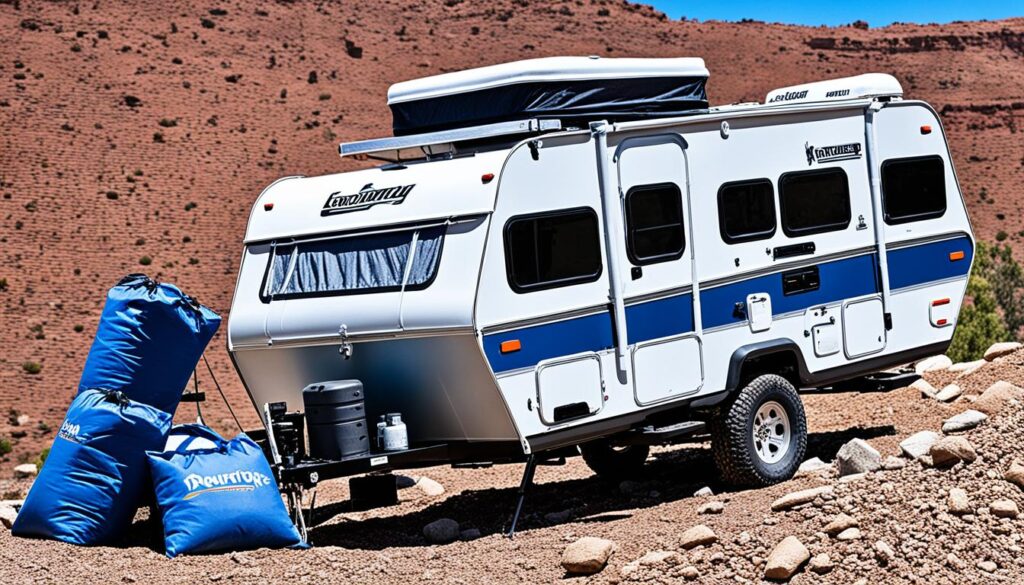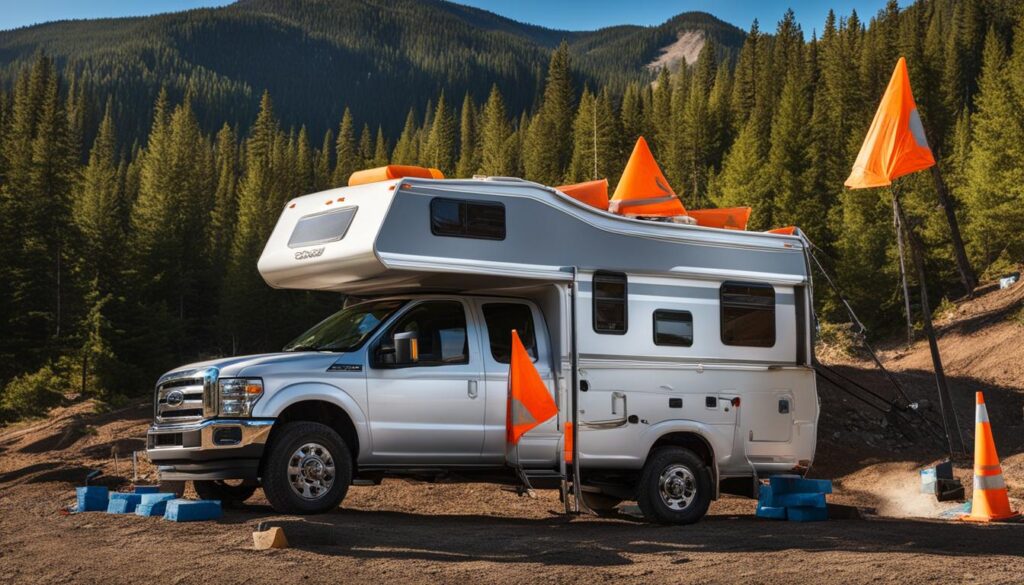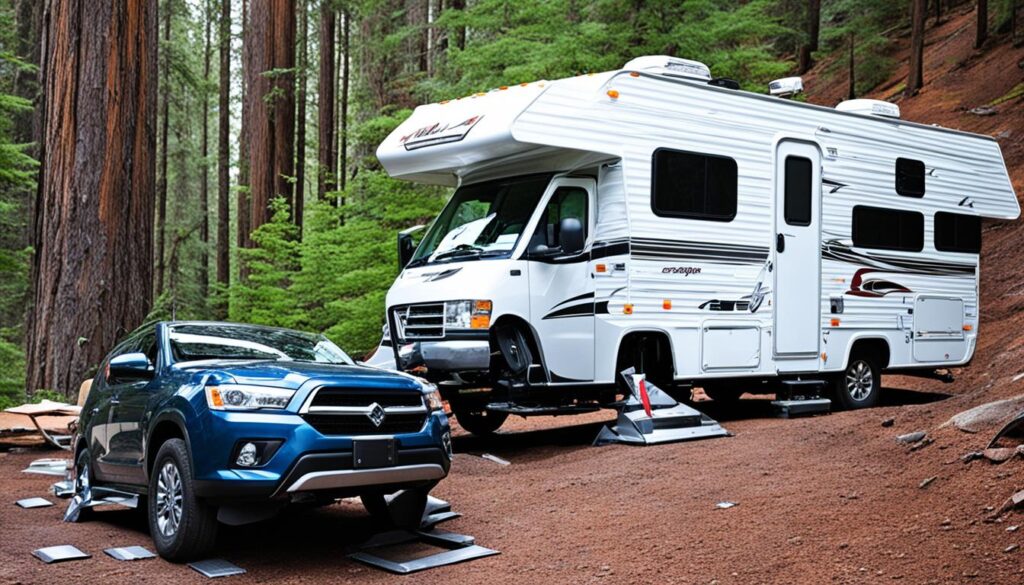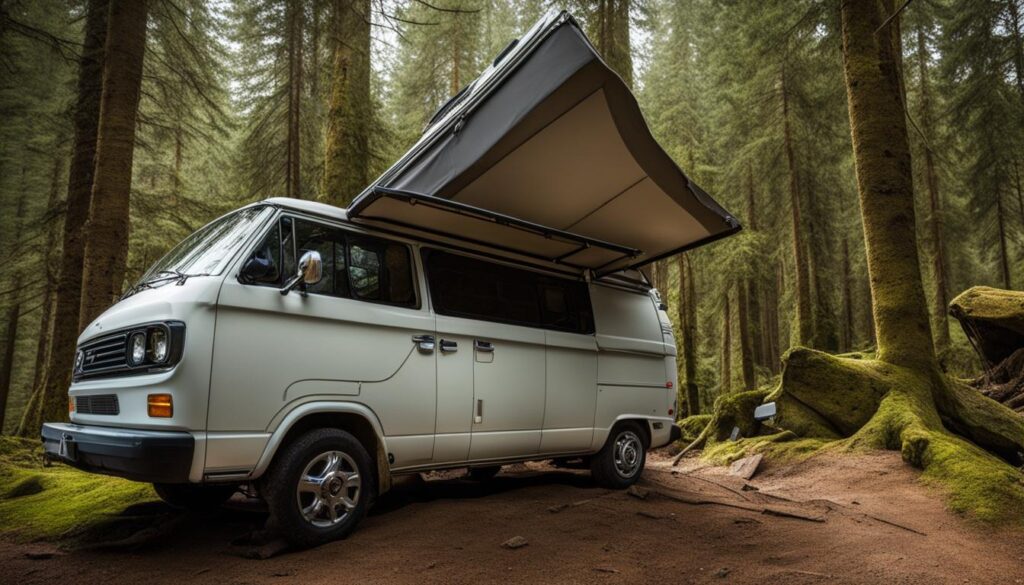When it comes to camping, safety is a top priority for every adventurer. But have you ever wondered, can a camper tip over when parked? In this article, I’ll unravel the truth and explore the risks and precautions associated with camper stability to ensure your camping experience is worry-free.
Many factors can contribute to a camper tipping over, such as improper weight distribution, setting up on uneven ground, high-speed winds, and even towing techniques. But fear not, as there are precautions you can take to significantly reduce the risk. By understanding and implementing the right measures, you can enhance the stability of your camper and enjoy a safe and secure camping trip.
So, let’s dive into the details and discover the secrets to preventing camper tip overs and maintaining optimal camper stability. Don’t miss the insightful tips and guidelines that will make all the difference in safeguarding your camping adventures!
Key Takeaways:
- Improper weight distribution, uneven ground, high-speed winds, and improper towing can increase the risk of a camper tipping over.
- Proper setup, weight distribution, and towing techniques are crucial for camper stability.
- Weather conditions and the use of stabilizing equipment play a vital role in preventing camper tip overs.
- Choosing a level and stable spot, adhering to speed limits, and being mindful of signs of instability are essential precautions to prevent tipping.
- In case of a tip over, following recovery and repair procedures is crucial for camper safety and minimizing damage.
Contents
Factors Influencing Pop-Up Camper Stability
When it comes to the stability of a pop-up camper, there are several factors that come into play. These factors can significantly affect the safety and overall experience while using a camper. It’s important to be aware of these factors and take the necessary precautions to ensure a stable and secure camping trip.
Weight Distribution
Proper weight distribution plays a crucial role in maintaining camper stability. Placing heavy items low near the axle helps to keep the center of gravity low, reducing the risk of the camper becoming unstable. On the other hand, improper weight distribution, where heavy items are disproportionately placed on one side, can shift the balance and increase the risk of tipping over.
Uneven Ground
Setting up a pop-up camper on uneven ground can be a recipe for disaster. Uneven ground puts excessive weight on one side of the camper, making it more susceptible to tipping. It’s important to choose a level and stable spot for parking the camper to minimize the risk of imbalance and maintain stability.
High-Speed Winds
High-speed winds can pose a significant threat to camper stability. Strong gusts of wind can cause the camper to sway and potentially tip over, especially if it’s not properly secured. It’s crucial to be aware of the weather conditions and take appropriate measures, such as using wind-blocking devices or positioning the camper in a sheltered area, to minimize the impact of high-speed winds.
Improper Towing
Towing a pop-up camper requires careful attention to ensure stability on the road. Improper towing practices, such as exceeding the vehicle’s towing capacity or using incorrect hitching techniques, can lead to instability and tipping. It’s essential to adhere to the recommended towing guidelines provided by the manufacturer and use appropriate towing equipment to maintain proper balance and control.
By understanding and addressing these factors, campers can significantly enhance the stability and safety of their pop-up campers. Proper weight distribution, choosing a level parking spot, considering weather conditions, and following correct towing practices are all essential steps to ensure a stable and enjoyable camping experience.

| Factors | Influence on Camper Stability |
|---|---|
| Weight Distribution | Proper weight distribution maintains stability, while improper distribution can increase tipping risk. |
| Uneven Ground | Setting up on uneven ground puts excess weight on one side, compromising stability. |
| High-Speed Winds | Strong winds can cause the camper to sway and potentially tip over if not properly secured. |
| Improper Towing | Exceeding towing capacity and using incorrect techniques can lead to instability and tipping. |
Preparing, Hauling, and Setting Up Your Camper Properly
Proper preparation, hauling, and setup are vital to ensuring the stability of your camper. By following these essential steps, you can minimize the risk of tipping and enjoy a safe and enjoyable camping experience.
Before towing your camper, it’s crucial to consider the hauling vehicle’s capacity and ensure that it can handle the weight. Exceeding the vehicle’s towing capacity can lead to instability and potentially dangerous situations. Always consult your vehicle’s manual or seek professional advice to determine the appropriate weight limits.
When on the road, it’s important to drive at safe speeds and avoid sharp turns. Maintaining a steady pace and following traffic regulations will help maintain stability during transit. Be mindful of the size and weight of your camper when changing lanes or overtaking vehicles.
Once you’ve arrived at your destination, selecting a level and stable spot for setting up the camper is crucial. Before settling on a location, carefully inspect the ground for any unevenness or potential hazards. Uneven ground can compromise the stability of your camper, increasing the risk of tipping. Utilize leveling devices, such as leveling blocks or ramps, to ensure your camper is properly balanced.
Refer to your camper’s user manual for specific instructions on unhitching and setting up. Properly unhitching your camper and securing all attachments is vital for maintaining stability. Ensure all connectors, such as electrical and water connections, are securely in place. Use stabilizer jacks to provide additional support and maintain balance when the camper is fully set up.

By following these steps, you can prepare, haul, and set up your camper properly, reducing the risk of tipping and enhancing your overall camping experience. Remember, safety should always be the top priority when enjoying the great outdoors.
Safety Precautions to Prevent Tipping
When it comes to enjoying a relaxing camping trip in your pop-up camper, safety should always be a top priority. Taking necessary precautions can help prevent tipping and ensure a worry-free experience. Here are some essential safety measures to consider:
1. Choose a Stable and Level Parking Spot
To minimize the risk of tipping, it’s crucial to park your camper on stable and level ground. Look for a flat surface that provides a solid foundation for your camper. Avoid parking on slopes or uneven terrain as they can increase the risk of instability.
2. Consider Weather Conditions
Weather can play a significant role in camper stability. Pay attention to weather forecasts, especially during windy conditions. Strong gusts of wind can cause your camper to sway or tip over. If high winds are expected, consider postponing your trip or finding a sheltered location to park.
3. Invest in Stabilizing Equipment
Stabilizing equipment is designed to enhance camper stability and reduce the risk of tipping. Consider investing in stabilizer jacks, tongue jacks, and sway control devices. These tools help distribute weight evenly and minimize movement during transit or when parked.
4. Adhere to Speed Limits and Drive at Safe Speeds
The speed at which you travel can significantly impact camper stability. To maintain control over your camper and reduce the risk of tipping, always adhere to speed limits and drive at safe speeds. Avoid sudden maneuvers, sharp turns, and aggressive driving.
By following these safety precautions, you can greatly reduce the risk of camper tipping and ensure a safe and enjoyable camping experience.

| Precautions | Description |
|---|---|
| Choose a Stable and Level Parking Spot | Parking on stable and level ground minimizes the risk of tipping. |
| Consider Weather Conditions | Avoid parking in high winds or adverse weather conditions that can cause instability. |
| Invest in Stabilizing Equipment | Stabilizer jacks, tongue jacks, and sway control devices enhance camper stability. |
| Adhere to Speed Limits and Drive at Safe Speeds | Driving within speed limits and avoiding aggressive maneuvers reduces the risk of tipping. |
Signs Your Pop-Up Camper Is About to Tip Over
When using a pop-up camper, it’s essential to pay attention to signs that indicate potential tipping. Recognizing these signs can help you take immediate action to prevent accidents and ensure the safety of yourself and your fellow campers.
Unusual Sounds
One of the first signs of camper instability is unusual sounds coming from the camper itself. Keep an ear out for groaning, creaking, or cracking sounds, as they may indicate that the camper is becoming unstable. These noises can be indicative of shifts in weight distribution or structural strain, and it’s important to investigate and address them promptly to prevent tipping.
Shaking or Swaying
If you notice your pop-up camper shaking or swaying more than usual, it could be a sign of instability. Factors such as uneven ground or improper weight distribution can cause the camper to rock back and forth. Pay attention to any excessive movement and take steps to stabilize the camper before it reaches a tipping point.
Sounds Coming from the Vehicle or Hitch
Unusual sounds coming from your towing vehicle or the hitch connection can also indicate strain caused by camper tipping. Listen for any unexpected noises like grinding or scraping, as they may suggest an imbalance between the camper and the vehicle. Taking immediate action, such as adjusting weight distribution or securing the hitch connection, can help prevent further instability.
Being aware of these signs is crucial in maintaining the stability and safety of your pop-up camper. If you notice any of these indicators, it is recommended to assess the situation and take appropriate measures to prevent tipping. Regular maintenance, proper weight distribution, and following manufacturer guidelines for camper setup and towing can help minimize the risk of camper tip overs.
| Signs of Camper Tipping | Actions to Take |
|---|---|
| Unusual sounds like groaning, creaking, or cracking | Investigate and address the source of the sounds promptly. Check for shifts in weight distribution and ensure proper fastening of components. |
| Shaking or swaying of the camper | Stabilize the camper by adjusting weight distribution, using stabilizing equipment, or leveling uneven ground. |
| Sounds coming from the vehicle or hitch | Check the hitch connection, adjust weight distribution, and ensure the towing vehicle is properly equipped to handle the camper’s weight. |
Recovery and Repair if Tipped Over
If your pop-up camper has tipped over, it’s crucial to follow the proper recovery and repair procedures to ensure the safety and functionality of your vehicle. The first step is to carefully assess the damage to determine if any structural or mechanical repairs are needed. Look for signs of bent frames, broken hinges, or damaged appliances.
Once you have assessed the damage, prioritize safety measures before attempting to recover the camper. Make sure the camper is secure and stable to avoid any further accidents or injuries. If the damage is extensive or you lack the necessary expertise, it’s recommended to seek assistance from professionals who specialize in camper repairs.
As you navigate the recovery and repair process, don’t forget to consider insurance considerations. Document the incident by taking photographs and gathering all relevant information, as this documentation may be necessary when filing an insurance claim. Consult your insurance provider to understand the coverage and claim process.
In conclusion, recovering a tipped camper requires a careful assessment of damage, prioritizing safety measures, and seeking professional assistance when needed. By following these steps and considering insurance considerations, you can ensure a thorough recovery and repair process to get your pop-up camper back on the road.
FAQ
Can a camper tip over?
Yes, a camper can tip over in certain situations.
What factors can influence pop-up camper stability?
Factors such as improper weight distribution, setting up on uneven ground, high-speed winds, and improper towing can affect camper stability.
How can I ensure camper safety?
To ensure camper safety, proper setup, weight distribution, and towing techniques are crucial.
What precautions should I take to prevent camper tipping?
Choose a stable and level parking spot, consider weather conditions, invest in stabilizing equipment, adhere to speed limits, and drive at safe speeds.
What are the signs that indicate a camper is about to tip over?
Unusual sounds, shaking or swaying, and sounds from the vehicle or hitch can indicate camper instability.
What should I do if my camper tips over?
Assess the damage, prioritize safety measures, secure the camper, and consider seeking professional assistance.






